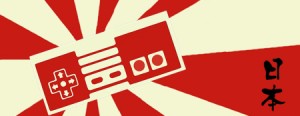The GRAND network has just posted a nice story on the upcoming conference on Japanese Game Studies, see Industry-academic engagement focus of upcoming Japan-Canada game studies symposium. It is nice to have GRAND (a network I am part of) commissioning stories.
Category: Conference
International Conference on Japan Game Studies
 I am part of a team putting together a International Conference on Japan Game Studies. We are organizing this with the Prince Takamado Japan Centre at the University of Alberta and the Ritsumeikan Center for Game Studies in Kyoto. The deadline for proposals is in two weeks. We are looking for papers on:
I am part of a team putting together a International Conference on Japan Game Studies. We are organizing this with the Prince Takamado Japan Centre at the University of Alberta and the Ritsumeikan Center for Game Studies in Kyoto. The deadline for proposals is in two weeks. We are looking for papers on:
- Cross cultural study of games and toys
- Localization of games
- Assessment of educational aspects of games
- Preservation of games and game culture
- Understanding player culture
- Game industry (in Japan and transnationally)
- Games and transmedia phenomena
- Games of chance
MLA 2013 Conference Notes
I’ve just posted my MLA 2013 convention notes on philosophi.ca (my wiki). I participated in a workshop on getting started with DH organized by DHCommons, gave a paper on “thinking through theoretical things”, and participated in a panel on “Open Sesame” (interoperability for literary study.)
The sessions seemed full, even the theory one which started at 7pm! (MLA folk are serious about theorizing.)
At the convention the MLA announced and promoted a new digital MLA Commons. I’ve been poking around and trying to figure out what it will become. They say it is “a developing network linking members of the Modern Language Association.” I’m not sure I need one more venue to link to people, but it could prove an important forum if promoted.
Digital Humanities Talks at the 2013 MLA Convention
The ACH has put together a useful Guide to Digital-Humanities Talks at the 2013 MLA Convention. I will presenting at various events including:
- Get Started in Digital Humanities with Help from DHCommons – an unconference workshop organized by DHCommons. I’ll be showing Voyant and TAPoR 2.0. My script is here: http://hermeneuti.ca/node/250
- I’ll be presenting “Theoretical Things for the Humanities” as part of a session organized by Stefan Franchi on Digital Humanities and Theory.
- I’ll be part of a panel on Open Sesame: Interoperability in Digital Literary Studies. This panel organized by Susan Brown has a stellar list of participants.
Eyeo Festival
Jennifer sent me a link to what sounds like a phenomenal Eyeo Festival in Minneapolis last summer. While I didn’t attend, I am watching the Eyeo2012 Vimeo channel. These are some of the most creative people at the intersection of art and computing.
Conference Report of DH 2012
I’m at Digital Humanities 2012 in Hamburg. I’m writing a conference report on philosophi.ca. The conference started with a keynote by Claudine Moulin that touched on research infrastructure. Moulin was the lead author of the European Science Foundation report on Research Infrastructure in the Humanities (link to my entry on this). She talked about the need for a cultural history of research infrastructure (which the report actually provides.) The humanities should not just import ideas and stories about infrastructure. We should use this infrastructure turn to help us understand the types of infrastructure we already have; we should think about the place of infrastructure in the humanities as humanists.
Digital Infrastructure Summit 2012
A couple of weeks ago I gave a talk at Digital Infrastructure Summit 2012 which was hosted by the Canadian University Council of Chief Information Officers (CUCCIO). This short conference was very different from any other I’ve been at. CUCCIO, by its nature, is a group of people (university CIOs) who are used to doing things. They seemed committed to defining a common research infrastructure for Canadian universities and trying to prototype it. It seemed all the right people were there to start moving in the same direction.
For this talk I prepared a set of questions for auditing whether a university has good support for digital research in the humanities. See Check IT Out!. The idea is that anyone from a researcher to an administrator can use these questions to check out the IT support for humanists.
GRAND 2012 Conference Report
Last week I was at the GRAND 2012 conference. GRAND (Graphics, Animation, and New Media) is a Networks of Centres of Excellence that brings together people across disciplines and across the country around gaming, new media and so on. You can see my GRAND 2012 conference notes here.
This year we had two of the best keynotes of any conference I have been to. Valerie Steeves talked about her research into parents and youth on the internet. The change in attitudes of both parents and youth to the internet between 2000 and today was dramatic. Ken Perlin was the closing keynote and he showed Java apps that he wrote as experiments. It made me want to learn to program in Java just to have as much fun as he was having.
Tokyo DH Symposium 2011
Two days ago, on November 29th, 2011, I attended a symposium at Tokyo University on “The Establishment of a Knowledge Infrastructure for the Next Generation and the Mission of Digital Humanities.” This was organized by Masahiro Shimoda and had, among others, John Unsworth as a keynote speaker. I posted my conference notes on philosophi.ca.
Conference Report on DH-JAC2011
I am at the 2nd International Symposium on Digital Humanities for Japanese Arts and Cultures, DH-JAC 2011. I am writing a live conference report here on philosophi.ca. Yesterday I presented a response to Mitsuyuki Inaba’s survey of the work of the Web Technologies group (PDF) of the Global COE Digital Humanities Center for Japanese Arts and Cultures.
